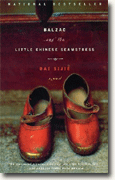Balzac & the Little Chinese Seamstress
Dai Sijie
book reviews:
· general fiction
· chick lit/romance
· sci-fi/fantasy
· graphic novels
· nonfiction
· audio books
· author interviews
· children's books @
curledupkids.com
· DVD reviews @
curledupdvd.com
newsletter
win books
buy online
links
home
for authors
& publishers
for reviewers

 |
Balzac & the Little Chinese Seamstress Dai Sijie Anchor Paperback 192 pages October 2002 |
|
Balzac and the Little Chinese Seamstress, translated from the original French (the book was a bestseller in France) is a tale centered on, of all things, the Cultural Revolution of China's Chairman Mao Zedong. Anyone who takes for granted the freedom from government that Western cultures enjoy would do well to read this book. But this wonderful novel (novella really) is not about politics,except in a cursory way; nor is it a treatise on the evils of China during the reign of Chairman Mao. It is, instead, a gentle, wise and humorous tale of two teenaged friends, young boys, and of a young teenaged girl, theseamstress of the title, whose striking beauty charms them both.
Luo and his friend, the narrator of the book, are young boys taken from their homes (as were many during the Cultural Revolution) and sent to a remote village to be "re-educated". During the "revolution" all the universities were shut down and any boy or girl who was labeled an "intellectual" (which meant any child who went to high school) was sent to the countryside to learn and live the life of peasants. The two friends are banished (in effect) for their crime of finishing high school to a village near a great mountain called the "Phoenix of the Sky". There is humor in the tale, such as the fact that Luo brings with him a clock, shaped like a rooster, by which he keeps time. The village has never before seen an alarm clock and so the object obtains the status of a small idol. Luo takes advantage of that by changing the time now and then so as to gain an extra hour's sleep from a headmaster who depends upon the clock to tell him when to send the boys out to work. The work the boys must do is grinding, physical and filthy labor for which they are not paid. They work for the good of the "revolution". It's no wonder they seek to escape from it now and then. No one being re-educated is permitted to read any books excepting the little book of sayings written by Chairman Mao. It is when, through a series of events, they obtain a book written by Balzac (the reading of which is now a crime) that suddenly the world of literature and of ideas abruptly opens to them. They are so hungry for more that all they can do is dream (and scheme) about getting other such books. They later meet the third primary character in this book, the very beautiful young seamstress, and, by relating to her the words of Balzac, produce in her too the desire for more such words and thoughts. She is as hungry for new stories and ideas as are the two boys. Luo, now in love with the girl, wants to obtain more books for her, not only to please her but also to raise her up from her lack of education to become something other than the peasant girl she is (albeit a beautiful one). In that desire to "re-educate" the girl he loves resides their ultimate future. This is a wonderful story about relationships and love, about the buoyancy of youthful souls thrown into the cold and potentially drowning waters of very trying circumstances, and, lastly, about the need for those things in our lives that stir our imaginations to life and so generate fresh desires and new dreams within us. It is the stirring of human imagination that ultimately changes the world. Originally published on Curled Up With A Good Book at www.curledup.com. © Mary B. Stuart, 2002 |
| Other books by Dai Sijie: |
|
|
|
 Click here to learn more about this month's sponsor! |
|
| fiction · sf/f · comic books · nonfiction · audio newsletter · free book contest · buy books online review index · links · · authors & publishers reviewers |
|
| site by ELBO Computing Resources, Inc. | |
 Balzac and the Little Chinese Seamstress reads like an amalgam of a Grimm's fairy tale and a story by the great writer of realism, Guy de Maupassant (rather than the title-named Balzac). Certainly the ending is not unlike the endings in many a Maupassant tale in its surprise and its quietly humorous perversity.
Balzac and the Little Chinese Seamstress reads like an amalgam of a Grimm's fairy tale and a story by the great writer of realism, Guy de Maupassant (rather than the title-named Balzac). Certainly the ending is not unlike the endings in many a Maupassant tale in its surprise and its quietly humorous perversity.